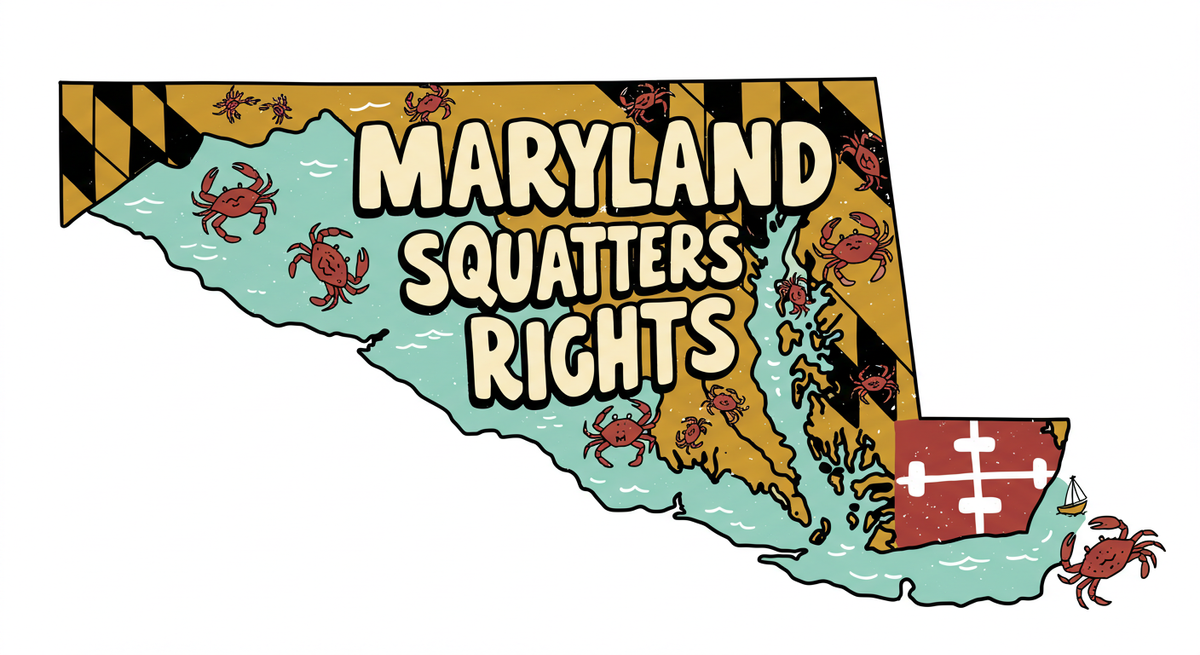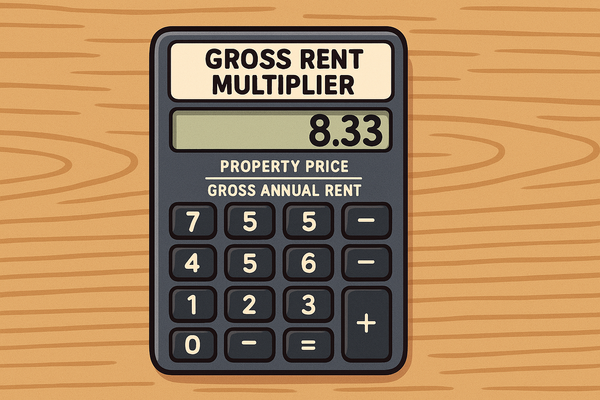Maryland Squatter's Rights Guide: 2025 Laws, HB 202, and Property Protection
Maryland law states that an individual may attempt to gain title and ownership of a property through adverse possession after residing there continuously for twenty years.

Maryland law states that an individual may attempt to gain title and ownership of a property through adverse possession after residing there continuously for twenty years, but that process is becoming more scrutinized following high-profile cases.
Even if a squatter remains on the property for the full two decades, they must also meet strict requirements, including open and notorious possession, exclusive control, and actual possession before they can initiate a legal claim for adverse possession.
For property owners in Maryland, understanding squatter's rights laws is essential to protect your investment and prevent potential loss of property through adverse possession claims.
Key Takeaways
- Maryland requires squatters to occupy property continuously for 20 years before they can file an adverse possession claim
- The proposed House Bill 202 (2025) aims to provide stronger protections against fraudulent squatting operations
- Maryland doesn't require squatters to pay property taxes or have color of title to make a valid adverse possession claim
- Squatters are increasingly using sophisticated tactics, including counterfeit documentation
- Regular property inspections and security measures are the best prevention against squatters
- Maryland's 20-year requirement offers stronger property owner protections than many neighboring states
But First... A Squatter Snippet
The Sovereign Squatter: In a brazen display of sovereign citizen ideology, 28-year-old Lamont Butler claimed ownership of a $6 million Bethesda mansion previously visited by Bill and Hillary Clinton. Butler, who renamed himself "Lamont Maurice El," hung "No Trespassing" signs, stocked the refrigerator, and filed paperwork citing an obscure 1787 treaty as justification. This audacious case of squattery is a prime example of the extreme challenges Maryland property owners may face from increasingly sophisticated squatters – particularly those of royal descendance...
Understanding Maryland Squatter Rights in 2025
In Maryland, squatting itself is not legal, though squatters have historically had certain rights through the doctrine of adverse possession. This legal principle within property law allows individuals who occupy vacant property without permission to potentially gain legal ownership after meeting specific conditions over a designated period. Homeowners should be aware that this longstanding doctrine exists but has strict requirements.
Trespassing vs Squatting
It's important to understand the distinction between squatting and trespassing.
Trespassing is a criminal offense that involves entering property without permission. Squatting typically involves a person living on a property for an extended period without authorization.
The distinction may seem like it's just a parsing of words, but it becomes important in how law enforcement can respond to each situation, particularly in cases of wrongful detainer where legal proceedings may be necessary.
With increasing concerns about sophisticated squatting operations, including those using fake lease documents to claim residence, Maryland legislators have proposed reforms to strengthen property owners' rights while maintaining the historical legal doctrine of adverse possession under strictly defined circumstances.
Maryland Adverse Possession Requirements
For Maryland squatters seeking ownership through adverse possession, the state requires adherence to the "OCEAN" criteria over a continuous 20-year period:
Open
The occupation must be visible and obvious to anyone, including the rightful owner. This prevents hidden or secretive occupation from qualifying for adverse possession. The squatter must live openly as if they were the rightful owner.
Continuous
The squatter must occupy the property continuously for 20 years without interruption. Any temporary abandonment resets the clock on the adverse possession claim. This twenty-year timeframe is longer than many other states require.
Exclusive
The possession must be exclusive, meaning the squatter cannot share the property with others, including the rightful owner. The squatter must have sole control over the property.
Actual
The squatter must physically occupy the property and treat it as their own. This includes maintaining the property, making improvements, or otherwise demonstrating actual possession. Simply claiming the property without physical occupation is insufficient.
Hostile // Notorious
In legal terms, "hostile" does not imply aggression but rather indicates that the occupation is without the owner's permission and against their rights. This can include situations where the squatter honestly believes they have a right to the property due to a misunderstanding or error.
Unlike some states, Maryland does not require squatters to have "color of title" (a document that appears to give them ownership but contains a legal defect) or to pay property taxes to establish an adverse possession claim. However, these factors may strengthen a squatter's case in court proceedings.
Maryland's HB 202: The Proposed Anti-Squatter Law
In January 2025, Maryland Delegate Ryan Nawrocki proposed House Bill 202, representing a potential significant change to Maryland's squatting laws. This legislation aims to fundamentally transform how unauthorized property occupation is addressed in the state.
Key Provisions of the Proposed HB 202:
- Criminal Penalties: The bill would establish criminal penalties for those who create or use fraudulent documentation to facilitate squatting
- Enhanced Eviction Process: The legislation aims to streamline the process for removing unauthorized occupants
- Targeting Criminal Networks: The bill specifically targets organized operations that create counterfeit leases and other documents
- Bipartisan Support: The legislation has reportedly garnered support from legislators across the political spectrum
According to Delegate Nawrocki, squatting has evolved into a widespread problem throughout Maryland, with both urban and rural communities affected. The bill specifically targets criminal networks that facilitate squatting through the creation and distribution of counterfeit documents, including fake leases that can appear more legitimate than authentic rental agreements.
This proposed legislation represents a decisive response to increasing concerns about squatting incidents throughout Maryland. While maintaining the legal concept of adverse possession, the law aims to create clearer pathways for property owners to remove unauthorized occupants.
How Maryland's Approach Differs From Other States
Maryland's approach to squatter rights with its 20-year requirement offers stronger property owner protections than many other states. Here's how Maryland compares:
Adverse Possession Timeframes
| State | Required Occupation Period | Tax Payment Required |
|---|---|---|
| Maryland | 20 years | No |
| Virginia | 15 years | No |
| Pennsylvania | 21 years | No |
| California | 5 years | Yes |
| Texas | 10 years (3 with deed) | Yes |
| Florida | 7 years | Yes |
Enforcement Approaches
Unlike states that have already enacted specific anti-squatting legislation with criminal penalties like Florida, Maryland currently treats squatting primarily as a civil matter requiring court proceedings. However, the proposed HB 202 would move Maryland closer to the Florida model by establishing clear criminal penalties for squatting activities.
States like New York and California still typically require property owners to go through lengthy eviction processes even for clear cases of squatting. If HB 202 passes, Maryland would join states taking a more aggressive approach to protecting property owners.
Criminal vs. Civil Treatment
The proposed Maryland legislation would establish clear criminal penalties for squatting activities, particularly those involving fraudulent documentation. This represents a shift toward treating sophisticated squatting operations as criminal matters rather than solely civil disputes.
How to Prevent Squatters in Maryland Properties
Prevention remains the most effective strategy for property owners. Here are key preventive measures to protect your property from squatters:
Regular Property Inspections
- Visit vacant properties regularly or hire a property management company to conduct routine inspections
- Document the condition of the property with dated photographs
- Maintain landscaping and exterior appearance to show active ownership
Security Systems and Monitoring
- Install visible security cameras and alarm systems
- Consider smart home security that provides remote monitoring capabilities
- Use motion-activated lighting around the property perimeter
- Install sturdy locks, security doors, and window reinforcements
Property Maintenance
- Keep utilities active but on minimum service levels for vacant properties
- Maintain landscaping and exterior appearance
- Collect mail regularly or have it forwarded
- Schedule timed interior lighting to create the appearance of occupation
Documentation and Signage
- Post "No Trespassing" signs prominently on the property
- Maintain comprehensive documentation of ownership
- Consider filing a "Declaration of Use" with your county property appraiser
- Maintain records of all property improvements made
Community Involvement
- Inform neighbors about vacant properties and ask them to report suspicious activity
- Join neighborhood watch programs
- Consider hiring a house-sitting service for extended absences
Professional Management
- Retain a property management company for vacant properties
- Consider short-term rentals if appropriate for your property
- Ensure quick tenant placement to minimize vacancy periods
These preventive measures not only deter potential squatters but also help establish a clear record of active ownership that can prove invaluable if adverse possession claims arise.
Legal Process for Removing Squatters in Maryland
If prevention fails and you discover squatters occupying your property, Maryland law currently requires you to follow established eviction procedures:
The Maryland Eviction Process for Squatters
- Document Ownership: Gather proof of property ownership such as deed, property tax records, and mortgage statements.
- Serve Notice: Provide appropriate written notice to the squatter, typically a 30-day notice to quit the premises.
- File Eviction Complaint: Submit a formal complaint with the district court in the county where the property is located.
- Court Hearing: Present evidence of your ownership and the squatter's unauthorized occupation at the scheduled hearing.
- Warrant of Restitution: If the court rules in your favor, a warrant will be issued giving the squatter four days to vacate.
- Sheriff Removal: If the squatter fails to leave voluntarily, the sheriff (not local police) has jurisdiction to physically remove them.
- Secure the Property: Once squatters are removed, immediately secure the property to prevent reoccupation.
Working with Law Enforcement
Property owners should involve law enforcement when dealing with squatters, particularly in cases of breaking and entering or when fraudulent documentation is presented. While police officers cannot directly evict squatters without court orders, they can document the unauthorized occupation and investigate potential criminal activities.
In cases involving the use of fraudulent documentation, such as counterfeit leases, landlords should file police reports and provide copies of legitimate ownership documents to investigating officers. This documentation can support both criminal investigations and civil eviction proceedings.
Landlord Rights and Responsibilities
As a property owner in Maryland, you have specific rights and responsibilities regarding squatters:
Rights:
- Pursue eviction proceedings against unauthorized occupants
- Seek damages for property destruction or unauthorized modifications
- File trespassing charges in appropriate circumstances
- Maintain and protect your property from unauthorized entry
Responsibilities:
- Follow legal procedures for removal rather than attempting "self-help" evictions
- Distinguish between squatters and legitimate tenants with legal disputes
- Properly document ownership and unauthorized occupation
- Secure property after removal to prevent reoccupation
Understanding these rights and responsibilities helps ensure that you address squatter situations legally and effectively while avoiding potential liability for improper removal procedures.
Tenant vs. Squatter: Legal Distinctions
It's crucial to understand the legal difference between a tenant and a squatter, as the removal processes differ significantly:
Tenants:
- Have lawful permission to occupy the property through a formal or informal agreement
- Pay rent (though may be behind on payments)
- Have established rights under Maryland landlord-tenant laws
- Must be removed through formal eviction proceedings
- Include former tenants whose leases have expired but continue to occupy the property
Squatters:
- Never had lawful permission to occupy the property
- Entered the property without authorization
- Pay no rent and have no rental agreement
- Must still be removed through legal eviction processes
- Have no legitimate claim to tenancy rights
Key Distinctions in Documentation:
- Tenants have lease agreements, rent receipts, or evidence of payment
- Squatters typically cannot produce legitimate documentation of occupancy rights
- Property owners should maintain records that clearly establish who is authorized to occupy their properties
Properly identifying whether an occupant is a tenant or squatter is essential for determining the appropriate legal process for removal and avoiding potential legal complications.
Case Study: The Bethesda Mansion Sovereign Citizen Claim
The 2013 case of Lamont Butler illustrates the audacious lengths to which some squatters will go. Butler, then 28, claimed ownership of a $6 million, 35,000-square-foot Bethesda mansion by declaring himself a "Moorish American National" with sovereign rights to the property.
How It Happened:
- Butler entered the vacant mansion and hung "No Trespassing" signs
- He created elaborate paperwork citing a 1787 peace treaty and the Vienna Convention
- He visited Maryland's Department of Assessments and Taxation requesting that tax records be updated
- He sent emails to the property's real estate agent declaring his intention to occupy the property
Resolution:
- Montgomery County police arrested Butler, categorizing his actions as breaking and entering, fraud, and attempted theft
- The case gained national attention as an example of the "sovereign citizen" movement's property claims
- Butler's claim had no legal merit under Maryland's adverse possession laws, which require 20 years of continuous possession
This case highlights the importance of monitoring vacant properties and quickly addressing unauthorized occupation. It also demonstrates the need for law enforcement and legal systems to recognize and respond to increasingly sophisticated squatting tactics.
Conclusion
Maryland's approach to squatter's rights has evolved in response to increasingly sophisticated unauthorized occupation techniques. The 20-year timeframe for adverse possession claims provides significant protection for vigilant property owners, while proposed legislation like House Bill 202 aims to further strengthen protections against fraudulent squatting operations.
For property owners, the keys to protecting your investment include:
- Regular monitoring and maintenance of properties
- Prompt action if unauthorized occupants are discovered
- Following legal procedures rather than self-help eviction measures
- Maintaining comprehensive documentation of ownership and property conditions
- Considering professional property management for vacant properties
By understanding Maryland's squatter rights laws and taking preventive measures, property owners can significantly reduce their risk of unauthorized occupation and potential adverse possession claims.
Resources and References
Disclaimer: This article provides general information and does not constitute legal advice. Consult with a qualified attorney for guidance on your specific situation.





